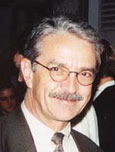Corporate, trade issues unfold at Chile summit
Recent events such as foot-and-mouth disease in South America and Europe, and bovine spongiform encephalopathy as well as dioxin pollution in Europe, have highlighted the complex nature of global trade, the fragility of the food chain, and the critical importance of veterinarians in the detection and effective control of these problems. An international conference, "Preparing the Veterinary Profession for Corporate and Trade Issues in the Americas," was held May 6-8 in Santiago, Chile, to focus attention on the critically important relationship between veterinary education, veterinary regulation, and the world food industry, and to stimulate international dialogue on the key issues of food safety, food security, and safe trade. The conference was funded by the US Department of Education, US Department of Defense, and US Department of Agriculture as well as the Merial and Fort Dodge corporations. Some 80 individuals representing seven countries attended. Leaders from government, academics, and industry—from each side of the equator—were asked to deliver plenary presentations on their vision of the future and how the three sectors could interface more effectively.
Regulatory veterinary medicine was represented by Dr. Eduardo Correa Melo, director of Panaftosa (Panamerican Center for Foot-and-Mouth Disease) and previously chief veterinary officer for Chile, and Dr. Alejandro Thiermann, senior trade coordinator for the USDA-APHIS. Both predicted a future in which regulatory veterinary medicine will shrink and there will be a demand for greater quality control, with increased partnering between regulatory and industry groups. Dr. Thiermann stated that globalization will have a more significant and beneficial effect on people worldwide than the industrial revolution did. In this new environment, evolving as a result of the creation of the World Trade Organization in 1995, preservation of competitive advantages requires transparency so that quality and credibility of governments will be paramount. Adequate academic training is essential to ensure a cadre of prepared professionals. Speaking for academics, Dr. Macarena Vidal, director, Faculty of Veterinary Medicine, Universidad Mayor, Santiago, Chile, and Dr. Lonnie King, dean, College of Veterinary Medicine, Michigan State University, addressed the tremendous economic, social, and cultural changes occurring with globalization and the necessity that veterinary education capitalize on these changes.
In South America, Dr. Vidal said, curricula are not well-harmonized with one another, and there is marked variation among degree programs, rendering it difficult to ascertain whether veterinarians on the whole are prepared to assume decision-making responsibilities regarding international transport of food. In North America, where there is a strong orientation toward companion animals, students often fail to take advantage of occasions to acquire the necessary skills for the evolving opportunities in agribusiness, public health, emerging diseases, and free trade, Dr. King said. If veterinary students do not prepare for this emerging market demand, the positions will be filled by other professions, which lack the broad-based scientific knowledge about animal physiology and disease causation. However, both Drs. Vidal and King voiced the concern that changing the curriculum is akin to "moving a graveyard" and that the academic systems need to be more flexible to meet rapidly changing global trends. Industry spokespersons included Dr. Juan Miguel Ovalle, presidente de Asociacion de Productores Avicolas de Chile, and Dr. Robert Jones, senior vice president, Alpharma Health Division, Fort Lee, NJ. Dr. Ovalle emphasized the importance of quality along the entire food production chain. Cost is no longer the single most important factor for consumers. As their standard of living increases, consumers are demanding quality at every point in the chain, from guarantees of environmental preservation and humane treatment of animals, to antimicrobial and other residue controls. Dr. Ovalle said these integrated concepts need to be considered more prominently in the regulatory framework and addressed sufficiently by academics.
Dr. Jones gave an overview of the current global situation with respect to animal health products. To maintain global food security, it will be essential that animal health companies and regulatory entities work in closer cooperation. Also, Dr. Jones said, animal health industries must educate entry-level veterinarians, because the current educational system does not provide the necessary skills to allow them to be immediately useful to the industry. These skills include molecular biology, statistics, experimental design, technical writing, and communications. Breakout sessions were held to address some of the critical areas mentioned in the plenary sessions. Several common themes emerged from these sessions. First, it is essential to develop a more flexible veterinary curriculum to allow students to acquire the skills necessary for working in the global environment. Second, greater use of the Internet was encouraged to allow information to flow freely regarding these issues. Third, government agencies need to involve universities more in developing emergency preparedness plans. Fourth, creation of academic student externships funded by industry would allow greater partnering and be mutually beneficial. Attendees encouraged organizers to hold a follow-up conference. At the conclusion of the conference, Dr. James E. Nave, president of the AVMA, stated, "With all of the current global changes involving international trade, it is imperative that our profession move forward on some of these critical issues. Failure to do so will be a big missed opportunity, and we cannot afford to miss any opportunities." The proceedings of the conference will be published in the Journal of Veterinary Medical Education. | |||||


